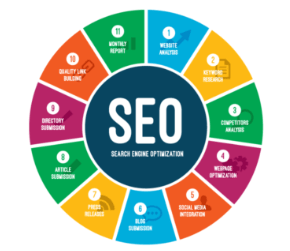What is 10 DuckDuckGo Facts For Digital Marketers & SEO Pros?
Digital marketing is a rapidly growing field that involves the use of various digital technologies and platforms to promote products or services online. A digital marketer is a professional who is responsible for developing, implementing, and managing digital marketing campaigns for businesses and organizations. They use a range of tools and techniques to reach a target audience, build brand awareness, generate leads, and drive sales.
Digital marketers are skilled in a variety of areas, including search engine optimization (SEO), pay-per-click advertising (PPC), social media marketing, email marketing, content marketing, and mobile marketing. They must be knowledgeable about the latest trends and best practices in each of these areas, as well as have a solid understanding of the overall digital landscape.
In addition to technical skills, digital marketers must possess excellent communication and analytical skills. They must be able to develop clear and compelling marketing messages, as well as analyze data and metrics to measure the effectiveness of their campaigns. They must also be able to collaborate effectively with other members of the marketing team, as well as with external partners and vendors.
Digital marketing is an exciting and dynamic field that offers many opportunities for growth and career advancement. As more and more businesses move their operations online, the demand for skilled digital marketers continues to increase. Whether you are interested in working for a large corporation, a small startup, or as a freelance consultant, digital marketing can be a rewarding and fulfilling career choice.
10 DuckDuckGo Facts For Digital Marketers
DuckDuckGo is a privacy-focused search engine that emphasizes user privacy and data protection. While it is not as popular as other search engines such as Google or Bing, it has a loyal user base and has been steadily gaining traction in recent years. Here are 10 facts about DuckDuckGo that digital marketers should know:
1. DuckDuckGo does not track users: Unlike many other search engines, DuckDuckGo does not track its users or store their search history. This means that users can search the web without worrying about their data being collected or sold to advertisers. This also means that digital marketers cannot use DuckDuckGo to target specific users based on their search history.
2. DuckDuckGo uses its own web crawler: DuckDuckGo uses its own web crawler, called DuckDuckBot, to index web pages and provide search results. This allows DuckDuckGo to maintain its privacy policy, as it does not need to rely on third-party web crawlers that may collect user data.
3. DuckDuckGo provides search results from multiple sources: DuckDuckGo does not rely on a single source for its search results. Instead, it aggregates results from a variety of sources, including Bing, Yahoo, and its own web crawler. This allows DuckDuckGo to provide more comprehensive search results while still maintaining user privacy.
4. DuckDuckGo offers search filters: DuckDuckGo allows users to filter their search results based on a variety of criteria, including date, region, and file type. This can be useful for digital marketers who are looking for specific information or want to target users in a particular region.
5. DuckDuckGo offers instant answers: DuckDuckGo provides instant answers to certain types of queries, such as weather forecasts, sports scores, and math equations. This can be useful for digital marketers who want to provide quick and easy information to their users.
6. DuckDuckGo offers a browser extension: DuckDuckGo offers a browser extension that blocks third-party trackers and forces websites to use HTTPS encryption. This can be useful for digital marketers who are concerned about their own website’s security or want to provide a more secure browsing experience to their users.
7. DuckDuckGo offers advertising: While DuckDuckGo emphasizes user privacy, it also offers advertising opportunities for businesses. However, these ads are not targeted based on user data and are displayed to all users who search for a particular keyword. This can be useful for businesses that want to reach a wider audience while still respecting user privacy.
8. DuckDuckGo has a loyal user base: While DuckDuckGo is not as popular as other search engines, it has a loyal user base that values its commitment to privacy. This can be useful for digital marketers who want to reach users who are concerned about their privacy and data protection.
9. DuckDuckGo is growing in popularity: DuckDuckGo has been steadily gaining traction in recent years, with its daily search traffic reaching over 100 million searches in 2021. This can be useful for digital marketers who want to tap into a growing user base and reach users who are looking for a more private and secure search experience.
10. DuckDuckGo is part of a larger trend: DuckDuckGo is part of a larger trend of privacy-focused technology, as more and more users become concerned about their data privacy and security. Digital marketers should be aware of this trend and consider how it may impact their own marketing strategies.
DuckDuckGo is a privacy-focused search engine that provides a secure and private search experience for its users. While it may not be as popular as other search engines, it has a growing user base that values
About SEO
Search Engine Optimization (SEO) is a set of techniques used to optimize websites and web pages to improve their visibility and ranking in search engine results pages (SERPs). In simpler terms, SEO involves making changes to your website or its content to make it more attractive to search engines like Google, Bing, or Yahoo. The goal is to increase the quantity and quality of traffic to your website from organic search results.
One of the fundamental principles of SEO is understanding how search engines work. Search engines use algorithms to crawl and index websites, looking for keywords and other indicators of relevance and quality. They then use these signals to rank pages in search results. SEO involves understanding these algorithms and using that knowledge to optimize your website and content to improve your ranking.
SEO can be broadly divided into two main categories: on-page optimization and off-page optimization. On-page optimization involves optimizing your website’s content and structure to make it more search engine-friendly. This includes things like using relevant keywords in your content, ensuring your website is mobile-friendly, improving your site’s loading speed, and making your site easy to navigate.
Off-page optimization, on the other hand, involves activities outside of your website that can influence your search engine rankings. This includes things like building high-quality backlinks to your site, engaging in social media marketing, and developing relationships with other websites in your industry.
It’s worth noting that SEO is a constantly evolving field, and the techniques that worked well in the past may not be as effective today. Search engine algorithms are constantly being updated, and what worked well a few years ago may now be considered spammy or manipulative. As such, it’s important to stay up-to-date with the latest SEO best practices and to be willing to adapt your strategies as needed.
SEO is a set of techniques used to optimize websites and web pages to improve their visibility and ranking in search engine results pages. It involves understanding how search engines work, making changes to your website and content to make it more search engine-friendly, and engaging in activities outside of your website to improve your search engine rankings.
SEO pros
Search engine optimization (SEO) is a set of techniques and strategies used to optimize websites and improve their visibility on search engines such as Google, Bing, and Yahoo. The benefits of SEO are numerous, and in this article, we will explore 10 of the most significant advantages of optimising your website for search engines.
- Increased website traffic: One of the most significant benefits of SEO is that it can increase website traffic. By optimizing your website for search engines, you can improve your website’s ranking on search engine results pages (SERPs), which can lead to more clicks and visits to your site. This increased traffic can lead to more sales, leads, and conversions.
- Better user experience: SEO is not only about optimizing your website for search engines; it’s also about improving the user experience on your site. By optimizing your site’s structure, content, and navigation, you can make it easier for users to find what they are looking for and navigate through your site. This can lead to a better user experience and more satisfied users.
- Increased brand visibility and credibility: SEO can help increase your brand’s visibility and credibility online. By appearing at the top of search engine results pages, you can increase brand awareness and establish your brand as an authority in your industry. This can help build trust and credibility with your target audience, which can lead to more conversions and sales.
- Cost-effective marketing: SEO is a cost-effective marketing strategy compared to other forms of digital marketing. While it may take some time and effort to see results, the long-term benefits of SEO can outweigh the costs. By investing in SEO, you can improve your website’s visibility and drive traffic to your site without paying for expensive ads.
- Higher return on investment: SEO can provide a higher return on investment (ROI) compared to other forms of digital marketing. Because SEO targets users who are actively searching for products or services like yours, the likelihood of converting these users into customers is higher. This means that you can achieve a higher ROI with SEO compared to other forms of digital marketing.
- Competitive advantage: Optimizing your website for search engines can give you a competitive advantage over your competitors. By appearing at the top of search engine results pages, you can attract more clicks and visits to your site, which can lead to more conversions and sales. This can help you outperform your competitors and gain a larger share of the market.
- Long-term results: SEO is a long-term strategy that can provide long-lasting results. While it may take some time and effort to see results, the benefits of SEO can continue for months or even years after you’ve implemented your optimization strategies. This means that the time and effort you invest in SEO can provide long-term benefits for your business.
- Local search optimization: SEO can also be used to optimise your website for local search. By targeting local keywords and phrases, you can improve your visibility in local search results and attract more customers to your brick-and-mortar business. This can be especially useful for small businesses that rely on local customers.
- Improved conversion rates: SEO can also help improve your website’s conversion rates. By optimising your website for search engines, you can attract more qualified leads to your site, which can lead to more conversions and sales. Additionally, by improving the user experience on your site, you can make it easier for users to convert and complete desired actions.
- Insights into customer behaviour: Finally, SEO can provide valuable insights into customer behaviour and preferences. By analysing search data and user behaviour on your site, you can gain a better understanding of your target audience and what they are looking for. This can help you optimise your website and marketing strategies to better meet the needs of your customers.
Conclusion
In conclusion, DuckDuckGo is a privacy-focused search engine that is gaining popularity among users who are concerned about their online privacy. Digital marketers and SEO pros should be aware of the growing use of DuckDuckGo and its impact on search engine optimization.
Overall, while DuckDuckGo currently has a smaller user base than other search engines, its focus on privacy and alternative ranking algorithm make it an important consideration for digital marketers and SEO pros. By understanding the unique strategies required for optimizing for DuckDuckGo, businesses can improve their online presence and reach a wider audience.
Frequently Asked Questions:
DuckDuckGo differs from other search engines in that it does not track user activity, it provides unbiased search results, and it does not customize search results based on a user’s browsing history.
Yes, you can optimize your website for DuckDuckGo by following standard SEO best practices such as using relevant keywords, providing high-quality content, and building high-quality backlinks.
Yes, backlinks are a part of DuckDuckGo’s ranking algorithm, just like other search engines.
No, DuckDuckGo does not have a webmaster tool or a submission process for websites.
Yes, DuckDuckGo has an advertising platform called “DuckDuckGo Ads” which allows businesses to advertise on the search engine.
No, DuckDuckGo does not provide keyword data, but you can use other tools like Google Analytics or SEMrush to get keyword insights.
Yes, you can use DuckDuckGo for keyword research, but keep in mind that the search volume data may not be as reliable as other search engines.
DuckDuckGo can be a good alternative to Google for digital marketing if your target audience values privacy and unbiased search results.
Yes, DuckDuckGo has a local search feature that can help users find businesses and services in their area.




